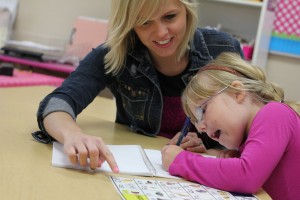Grant to aid UALR effort to improve first-grade literacy education
With the support of the Reading Recovery Council of North America, the UALR Center for Literacy soon will expand the reach of its Reading Recovery training program.
The center recently received a $7,000 grant from the national organization that will fund the training of seven new Reading Recovery teachers in an underserved school.
Dr. Linda Dorn, professor of reading education and director of the UALR Center for Literacy, is coordinating the training outreach. The seven first-grade educators all teach in the Normandy Schools Collaborative in St. Louis, Missouri, which lacks a reading recovery program and is classified as academically distressed.
The UALR center will play a major role in the district’s new comprehensive literacy system, a plan that also includes training kindergarten interventionists in the Comprehensive Intervention Model developed at UALR.
According to the center, Reading Recovery, a decades-old program originating in New Zealand, is the world’s most widely researched intervention for young children having extreme difficulty with early literacy learning.
The center’s clinical trainers will equip the St. Louis teachers to lead Reading Recovery programs at their schools.
Not only will they receive training from UALR’s experienced faculty, but they also will receive sets of Pioneer Valley books — designed to aid reading recovery — to use in their classrooms.

UALR’s Center for Literacy has a 20-year legacy of partnering with educators and schools throughout the nation to establish literacy enhancement programs that build students’ reading capabilities and confidence.
As Dorn stated in her proposal, the center team thinks the upcoming changes at the Normandy Schools Collaborative can be transformative: “The hope is that the implementation of this comprehensive literacy plan will improve not only the outcomes for the children of the district but will contribute substantially to the removal of the district from the list of academically distressed schools.”